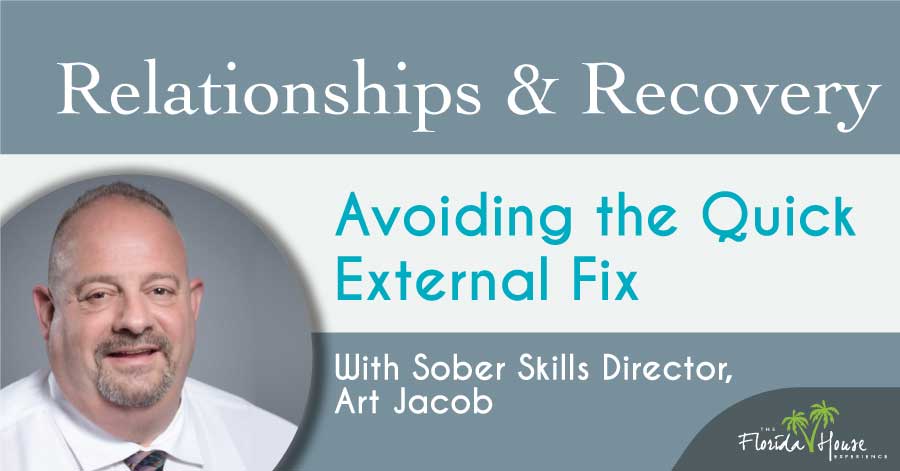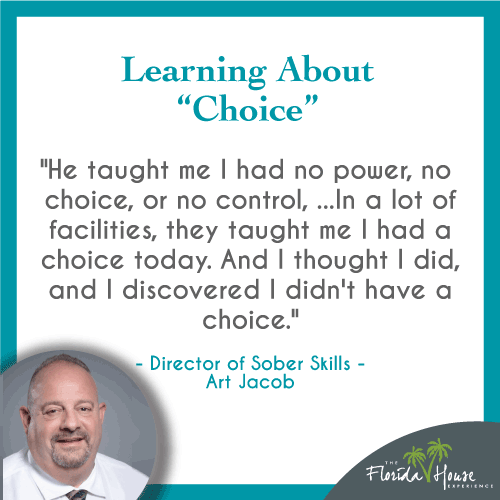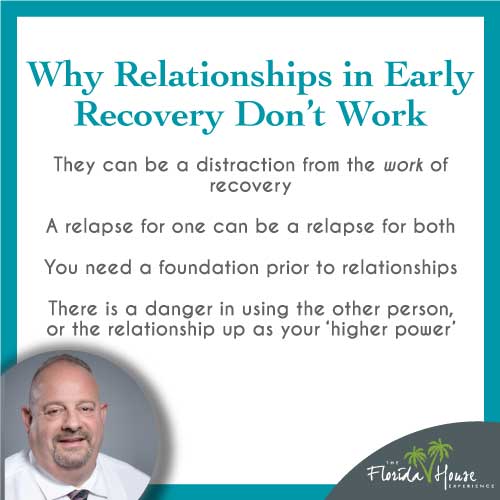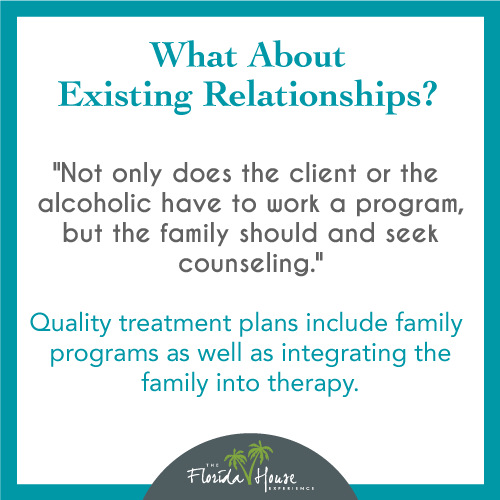
Sober Skills: Relationships and Their Impact on Recovery
The drive to develop relationships is a natural instinct, so it’s not surprising that many people attempt relationships during their road to recovery. And while relationships themselves aren’t necessarily a bad thing, Art Jacob, the Director of Sober Skills at FHE Health, says that developing new relationships at the beginning of recovery can be a bad thing.
As a recovered alcoholic and addict and a professional with 20 years of experience in recovery and addiction treatment, Jacob knows these truths from both sides. He shares some of his own journey as well as what his work with Sober Skills at FHE Health has taught him.
Jacob’s Personal Experience with FHE Health and 12 Steps
 Jacob is candid about his own battle with alcohol. “I’ve been in 27 institutions,” he says. “I got clean and sober at FHE Health more than 15 years ago.” Before that, he had a stint of 4.5 years clean before relapsing.
Jacob is candid about his own battle with alcohol. “I’ve been in 27 institutions,” he says. “I got clean and sober at FHE Health more than 15 years ago.” Before that, he had a stint of 4.5 years clean before relapsing.
When asked what happened at FHE Health 15 years ago to make a difference, Jacob says, “I had been in some great places with a lot of well-meaning people, but here (at FHE Health) I met a gentleman who knew what I was going to need. He explained to me what my problem was, which I thought I knew what my problem was. I thought it was the alcohol and drugs.”
Jacob says he learned that he’d been making alcohol his solution and that his problem was powerlessness. The first of the 12 steps of AA is admitting that you are powerless over alcohol and that your life has become unmanageable.
“He said, that’s your problem,” says Jacob. “Powerless is your problem. That doesn’t mean you’re never going to drink again. That means you’ll drink ’til the day you die.”
That’s a different message, Jacob says, than the one he received in other treatment programs. “He taught me I had no power, no choice, or no control,” Jacob notes. “In a lot of facilities, they taught me I had a choice today. And I thought I did, and I discovered I didn’t have a choice.”
Jacob said he learned that he needed power, not alcohol. And he found that power through a treatment program that walked him through the 12 steps.
That’s what Sober Skills does today for clients, he says. “We have a 12 Step immersion program where we do what this gentleman did with me 15 years ago. We provide a safe and supportive environment where clients are encouraged to participate to in a 12-step process in hopes they are able to internalize the material and ideally, bring about a psychic change in their own lives.”
The Problem With Developing Relationships Early in Recovery
 And it’s that simple and not simple at all, of course. While the Sober Skills program tries to minimize distractions to allow people to focus on recovery, distractions have a way of seeping in.
And it’s that simple and not simple at all, of course. While the Sober Skills program tries to minimize distractions to allow people to focus on recovery, distractions have a way of seeping in.
In fact, Jacob says, one common distraction is the development of relationships within the recovery environment. It feels like a fix, says Jacob. It feels good to have the security of a partner by your side, to be going through recovery together. And it’s natural – it’s what Jacob refers to as a “God-given instinct” to seek others in relationship.
But he says that it’s an external fix, and recovery has to be an internal fix. “Recovery is an inside job. You can’t fix the inside by fixing the outside. You can’t fix it with a relationship, lifting weights, getting a bunch of tattoos or running a marathon.”
“In 20 years of working in the field,” he says, “I’ve never, ever seen one relationship that has started in treatment be successful. They always end up in a disaster. Because it’s just like putting a bandaid on a gushing wound. Relationships take a lot of work. Recovery is actually a full-time job. It’s not something you go through and you’re finished. If you’re in a relationship and paying attention to a relationship, the other person tends to become the higher power. We start to worship the other person; we don’t want to lose them, so instead of going to a meeting or working with a sponsor, we spend time with the other person. We get away from a program and we’re still powerless.”
The result, he says, is that someone relapses. Often, both people do.
The bottom line on relationships and rehab, says Jacob, is that you need a foundation first. The foundation can’t be the relationship, which is why he cautions people to work through the 12 steps and recovery to develop a solid spiritual foundation before attempting a relationship with anyone else — whether they’re in recovery or not.
“The second part of the first step says that my life had become unmanageable,” he says. “So if my life is unmanageable and I get in a relationship with you, it’s like saying, ‘My life is unmanageable. Let me share it with you.'”
What Happens When You Have an Existing Relationship?
 But what if you’re already in a relationship? Jacob says that residential recovery is about offering a safe place where anyone can come to terms with their addiction and go through the 12 steps. That’s an individual journey, even for people in serious relationships or even married.
But what if you’re already in a relationship? Jacob says that residential recovery is about offering a safe place where anyone can come to terms with their addiction and go through the 12 steps. That’s an individual journey, even for people in serious relationships or even married.
That doesn’t mean the family shouldn’t be involved, though. He says that when someone is struggling with addiction, the entire family becomes sick and requires healing. “Not only does the client or the alcoholic have to work a program, but the family should and seek counseling.”
Slowly, the family is integrated back together after each member has sought their own therapy and program. Jacob says as that happens, they should begin to seek family therapy to continue to heal together.
Again, the bottom line is this: Relationships can’t be the higher power. Even if they already exist.
How Can Sober Skills Help With Your Recovery?
Sober Skills and FHE Health provide an environment that’s safe and protected with minimal distractions, so you can concentrate on working a 12 step program in hopes of having a spiritual experience. If you’re struggling with addiction and are powerless in the face of alcohol, call FHE Health today to find out how you can start learning more about your problem and seeking the real solution.






